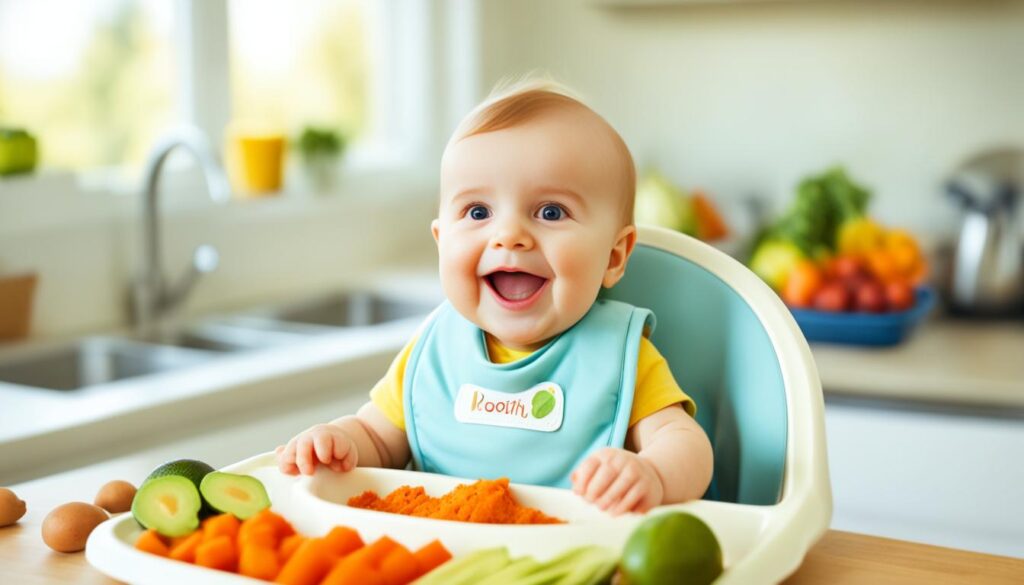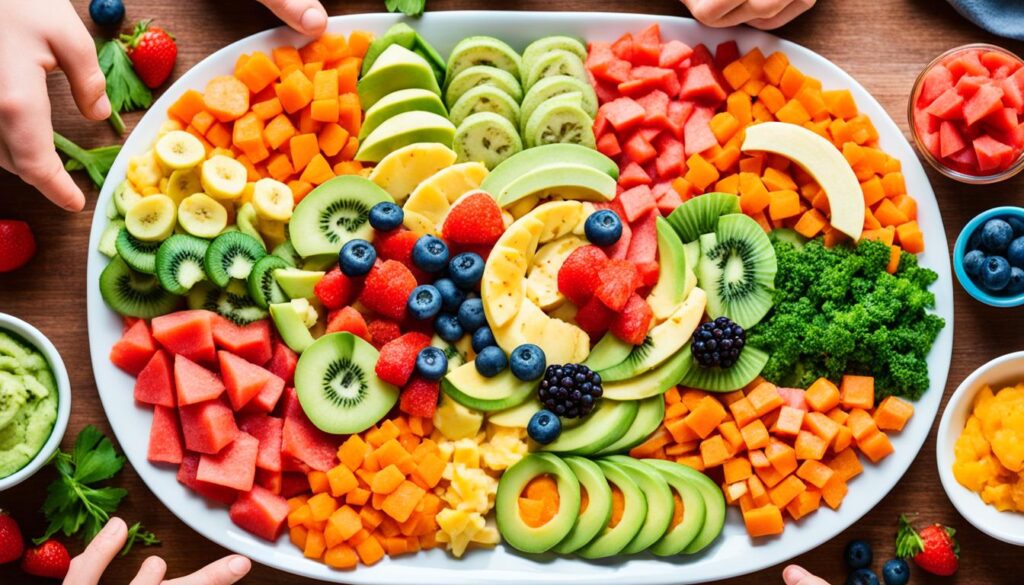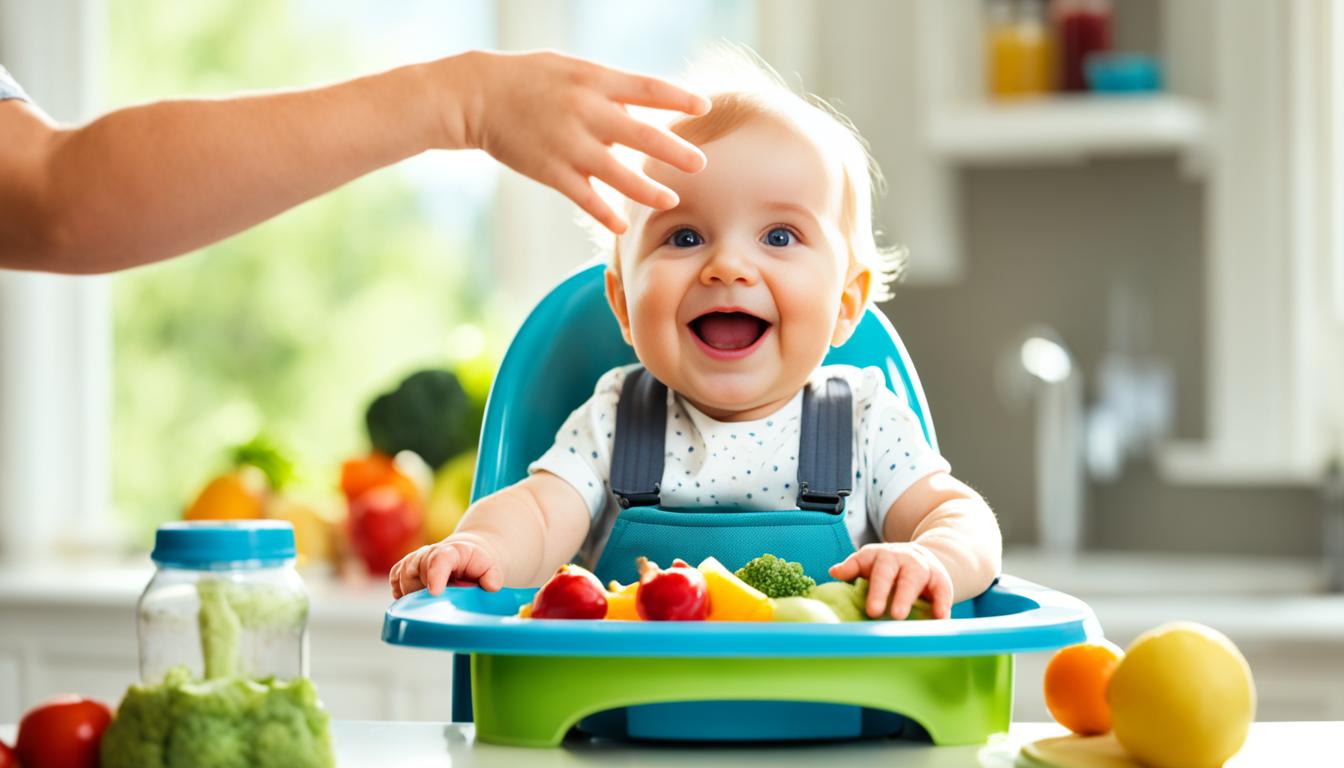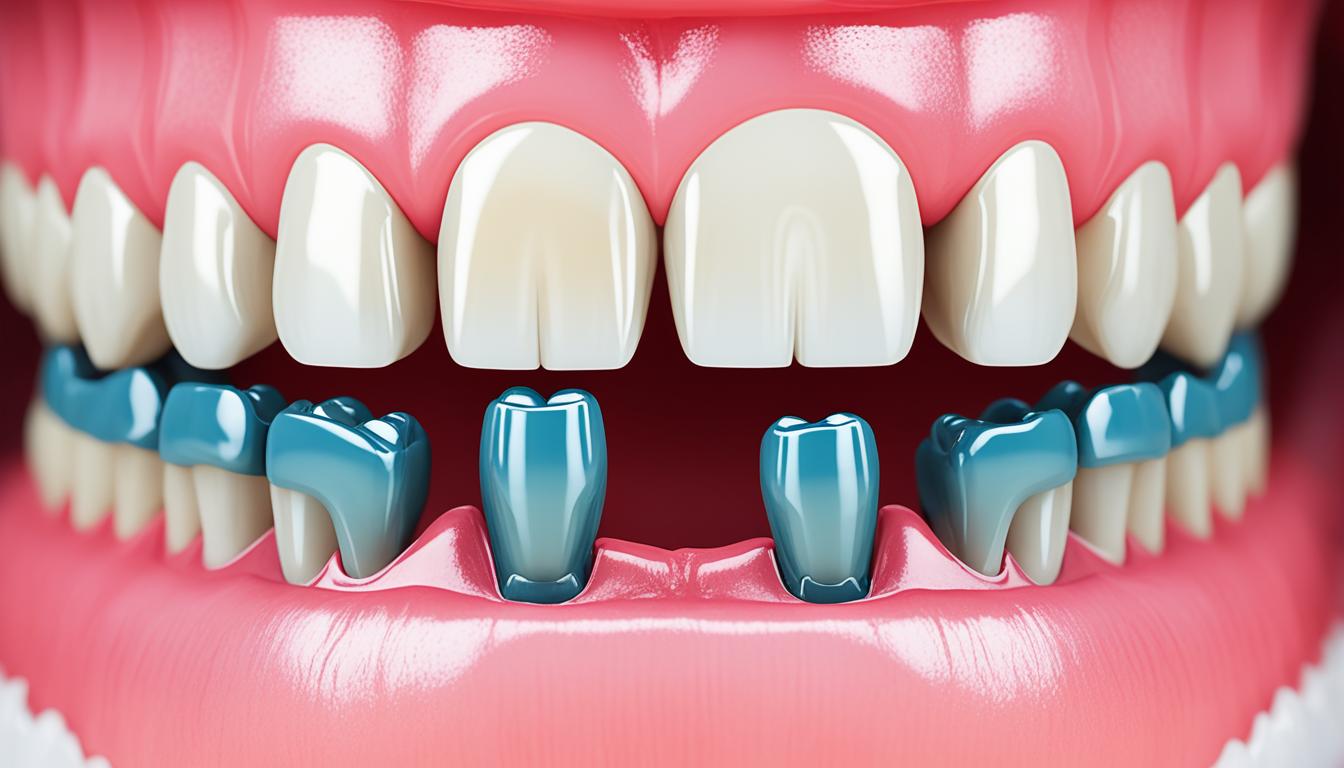Introducing First Foods For Baby: Top Choices!
Starting solids is an important milestone for babies, and it’s crucial to introduce the right foods at the right time. The American Academy of Pediatrics recommends starting baby food between 4 and 6 months of age. Signs that your baby is ready for solids include being able to sit up on their own, showing interest in mealtime, and being able to swallow food. When starting solids, it’s important to go slow and start with small amounts of food, gradually increasing as your baby becomes more comfortable.
Some of the best first foods for babies include infant cereal, sweet potato, banana, avocado, apples, pears, green beans, and butternut squash.
- Introduce solids to your baby between 4 and 6 months of age, when signs of readiness are present.
- Start with small amounts of food and gradually increase as your baby becomes more comfortable.
- Some great first food choices include infant cereal, sweet potato, banana, avocado, apples, pears, green beans, and butternut squash.
When to Start Baby Food
Starting solids at the appropriate time is a crucial milestone in your baby’s development. It’s essential to introduce baby food when your little one is ready and capable of handling solid foods. According to the American Academy of Pediatrics, the best time to start baby food is between 4 and 6 months of age.
Before beginning the journey of introducing solids to your baby, it’s important to look for signs of readiness. These signs include:
- Your baby can sit up on their own and hold their head steady.
- They show an interest in mealtime and display curiosity towards what you are eating.
- They have developed the ability to swallow food and are no longer pushing food out of their mouth with their tongue.
Waiting until these developmental milestones are met ensures that your baby is physically and neurologically prepared to handle solid foods safely.
Starting solids too early can be detrimental to your baby’s health. It increases the risk of choking, obesity, and other potential health issues. On the other hand, delaying the introduction of solids for too long can hinder your baby’s growth and development of solid food tolerance.
Always remember, every baby is unique, and it’s important to consult with your pediatrician to determine the best time to start solids for your little one based on their individual needs and developmental progress.
Introducing solids at the right time sets the foundation for a healthy relationship with food and promotes optimal growth and development. Now that you know when to start baby food, let’s explore how to introduce solids to your baby in the next section.
How to Start Baby on Solids

When it comes to introducing solids to your baby, it’s important to take it slow and be patient with the process. The transition from solely breastfeeding or formula feeding to solid foods can be a new experience for your little one, so it’s essential to create a positive and enjoyable mealtime environment. Here are some tips on how to start your baby on solids:
- Begin with a spoon: Instead of letting your baby eat with their hands right away, start by feeding them with a spoon. This can help them develop their motor skills and get accustomed to the new eating method.
- Start small: Begin with small amounts of food, about half a teaspoon at a time. This allows your baby to get a taste of the new food without overwhelming them. Gradually increase the quantity as your baby becomes more comfortable.
- Stick to one food at a time: Introduce a new food every three days and stick with the same food during that time. This helps you monitor your baby for any potential allergies or digestive issues. If your baby shows any signs of an allergic reaction, such as rash or diarrhea, consult your pediatrician immediately.
- Experiment with textures: If your baby doesn’t like pureed food, you can try mashing it or offering different textures to see what works best for them. Some babies prefer a slightly thicker consistency or small soft pieces they can pick up.
Remember, every baby is different, and their preferences may change over time. What works for one baby may not work for another, so stay flexible and adapt to their needs. The goal is to make the introduction to solids a positive and enjoyable experience for both you and your baby.
Expert Tip:
Mealtime should be a fun and interactive experience for your baby. Talk to them, encourage them to explore the new flavors, and make it a bonding moment between you and your little one.”
| Benefits of Starting Baby on Solids | Tips to Remember |
|---|---|
|
|
Best First Foods for Baby

When it comes to introducing solids to your baby, it’s important to choose the best first foods that are age-appropriate and packed with essential nutrients. While there are no strict rules about which foods to introduce first, there are some common choices that are loved by babies and recommended by experts.
Here are some of the best first foods for your little one:
| Food | Description |
|---|---|
| Infant Cereal (such as oatmeal, rice, or barley) | A great source of iron and easy to digest. It can be mixed with breast milk or formula for a smooth consistency. |
| Sweet Potato | Sweet and soft, sweet potatoes provide a good amount of vitamin A, which is essential for your baby’s growth. |
| Banana | Rich in potassium and naturally sweet, bananas are a favorite among babies. They also contain fiber, which aids digestion. |
| Avocado | Full of healthy fats and essential nutrients, avocados are a creamy and nutritious option for your baby’s first food. |
| Apples | A gentle fruit for your baby’s delicate tummy, apples are rich in fiber and vitamins. |
| Pears | Similar to apples, pears are a mild and nutritious fruit that can be easily pureed or mashed for your baby. |
| Green Beans | Loaded with vitamins and minerals, green beans provide a great introduction to vegetables for your little one. |
| Butternut Squash | The sweet and creamy texture of butternut squash makes it an ideal first food for your baby. |
Introducing vegetables before fruits can help your baby develop a taste for nutritious foods. However, it’s important to note that the order in which you introduce solids does not influence your baby’s preferences for certain foods later in life.
Remember, every baby is unique, so trust your instincts and consult with your pediatrician for personalized advice on the best first foods for your little one.
Introducing Allergenic Foods
Introducing allergenic foods to your baby can be a daunting task, but recent research suggests that early and frequent exposure to these foods can actually help prevent the development of allergies later in life. Gone are the days when it was recommended to delay introducing common allergenic foods such as dairy, eggs, fish, soy, shellfish, wheat, peanuts, and tree nuts.
Consult with your pediatrician to determine the right time to introduce allergenic foods to your baby, especially if your little one has a history of food allergies or eczema. It’s important to ensure that the introduction is done in a safe and appropriate manner, tailored to your baby’s individual needs. Age-appropriate formats can make the process easier and more enjoyable for both you and your baby.
Foods to Introduce and How
Here are some common allergenic foods for babies and age-appropriate ways to introduce them:
- Dairy: Start with small portions of yogurt or cheese. These can be offered as tasty additions to your baby’s meals.
- Eggs: Scrambled eggs are a great option to introduce this allergenic food. Ensure the eggs are fully cooked and soft for easy digestion.
- Peanuts: Mix thinned out peanut butter with other foods, such as oatmeal or mashed banana, to introduce this potential allergen gradually.
- Fish: Offer well-cooked fish, such as flaky white fish or salmon, in small portions. Ensure it is boneless and cooked thoroughly.
- Soy: Soy can be introduced through soy-based infant formula or tofu mashed to a suitable texture for your baby.
- Shellfish: Boiled or steamed shellfish, such as shrimp or crab, can be offered in small quantities to introduce this allergen.
- Wheat: Begin with wheat-based cereals or small portions of bread or pasta. Opt for whole grain varieties for added nutritional benefits.
- Tree nuts: Ground or finely chopped tree nuts, such as almonds or cashews, can be incorporated into purees or mixed with other foods.
Remember to start with small amounts of each allergenic food and gradually increase the quantity as your baby becomes more accustomed to them. Always monitor your baby for any signs of allergies or adverse reactions during and after each introduction.
Introducing allergenic foods to your baby doesn’t have to be overwhelming. By following the guidance of your pediatrician and introducing these foods early and often, you can help reduce the risk of allergies and lay the foundation for a healthy and diverse diet.
Introducing Solids Chart
If you prefer a structured approach to introducing solids, you can use an introducing solids chart as a guide. These charts provide suggestions for which foods to introduce at different ages and stages of your baby’s development. They can help you plan out your baby’s path to solid foods and ensure that you are offering a variety of nutritious options.
An introducing solids chart typically includes recommendations for 4 to 6 months, 6 to 9 months, and 9 to 12 months, indicating when and how to introduce different foods and textures.
Best Baby Foods at Different Ages
As your baby grows and progresses, their nutritional needs and abilities change. It’s important to introduce age-appropriate foods that provide the necessary nutrients for their development. Here are some of the best baby foods at different ages:
6 Months:
- Iron-rich infant cereal
- Well-cooked meats
- Mashed beans
At 6 months, babies are typically ready for mushy, pureed foods. Iron-rich foods like infant cereal, well-cooked meats, and mashed beans are great options to introduce at this age. These foods provide the essential nutrients for your baby’s growth and development.
7 Months:
- Soft fruits like mashed bananas or peaches
- Steamed and mashed vegetables such as carrots or sweet potatoes
- Plain whole-milk yogurt
At 7 months, babies can start exploring more flavors and textures. You can get creative with mixing different foods to introduce new tastes. Soft fruits, steamed and mashed vegetables, and plain whole-milk yogurt are excellent choices to expand your baby’s palate.
8 Months:
- Finger foods like small pieces of cheese or cooked pasta
- Cooked and mashed lentils or chickpeas
- Bite-sized soft cooked vegetables
By 8 months, babies can start trying more finger foods and self-feeding. This is a great time to introduce soft cooked vegetables, finger foods like small pieces of cheese or cooked pasta, and cooked and mashed lentils or chickpeas. Encourage your baby to explore different textures and practice their fine motor skills.
9 Months:
- Finger-sized soft fruits like small pieces of melon or berries
- Cooked and diced chicken or fish
- Soft cooked grains like quinoa or rice
By 9 months, babies can start enjoying a wide variety of fruits, vegetables, grains, and proteins. Finger-sized soft fruits, cooked and diced chicken or fish, and soft cooked grains are great options to introduce at this stage. Remember to continue offering breast milk or formula as their primary source of nutrition.
Introducing the right baby foods at each stage is crucial for your baby’s growth and development. As they explore new tastes and textures, ensure that their meals are nutritious, balanced, and age-appropriate. Consult with your pediatrician for personalized advice and guidance on your baby’s feeding journey.
Safety and Nutritional Considerations
When it comes to feeding your baby, their safety is of utmost importance. Avoid giving them any foods that can pose choking hazards, such as hard, sticky, or round foods. It’s crucial to prepare their meals in a way that is appropriate for their age and developmental stage, ensuring that the food is soft and easy to swallow.
Along with safety, considering your baby’s nutritional needs is essential. As they grow, they require a balanced diet that includes a variety of fruits, vegetables, grains, and proteins. This will help meet their nutritional requirements and support their overall development. Breast milk or formula should also remain an important part of their diet during these early stages.
While introducing new foods, there are certain items that should be avoided for babies. Honey should not be given to infants under one year old, as it poses a risk of botulism. Cow’s milk is difficult for babies to digest and does not provide the necessary nutrients they need at such a young age. Processed foods, which are often high in salt, sugar, or additives, should also be limited or avoided to maintain their health.
Remember, it’s always recommended to consult with your pediatrician for personalized advice and guidance on your baby’s specific dietary needs and any potential allergies they may have. They can provide tailored recommendations to ensure your little one’s safety and well-being.
FAQ
When should I start introducing solids to my baby?
According to the American Academy of Pediatrics, it is recommended to start introducing baby food between 4 and 6 months of age.
How can I tell if my baby is ready for solids?
Look for signs of readiness, such as sitting up on their own, showing interest in mealtime, and being able to swallow food.
How should I start introducing solids to my baby?
Start slow and feed your baby with a spoon. Begin with small amounts of food, gradually increasing as your baby becomes more comfortable. Stick with the same food for three days before introducing a new one.
What are some of the best first foods for babies?
Some top choices for first foods include infant cereal, sweet potato, banana, avocado, apples, pears, green beans, and butternut squash.
Should I introduce allergenic foods to my baby?
Recent research suggests that early and frequent exposure to allergenic foods can help prevent the development of allergies. It’s important to consult with your pediatrician before introducing allergenic foods, especially if your baby has a history of allergies or eczema.
Is there a chart I can use to guide me on introducing solids to my baby?
Yes, there are introducing solids charts available that provide recommendations for when and how to introduce different foods and textures based on your baby’s age and developmental stage.
What are some age-appropriate baby foods for different stages?
At 6 months, babies can start with pureed foods like infant cereal, well-cooked meats, and mashed beans. At 7 months, they can explore more flavors and textures. At 8 months, babies can try finger foods and self-feed. By 9 months, they can enjoy a variety of fruits, vegetables, grains, and proteins, alongside breast milk or formula.
What safety and nutritional considerations should I keep in mind when feeding my baby?
Avoid foods that pose choking hazards and prepare foods appropriate for your baby’s age and developmental stage. Ensure a balanced diet with a variety of fruits, vegetables, grains, and proteins. Avoid honey, cow’s milk, and processed foods. Consult with your pediatrician for personalized advice.










